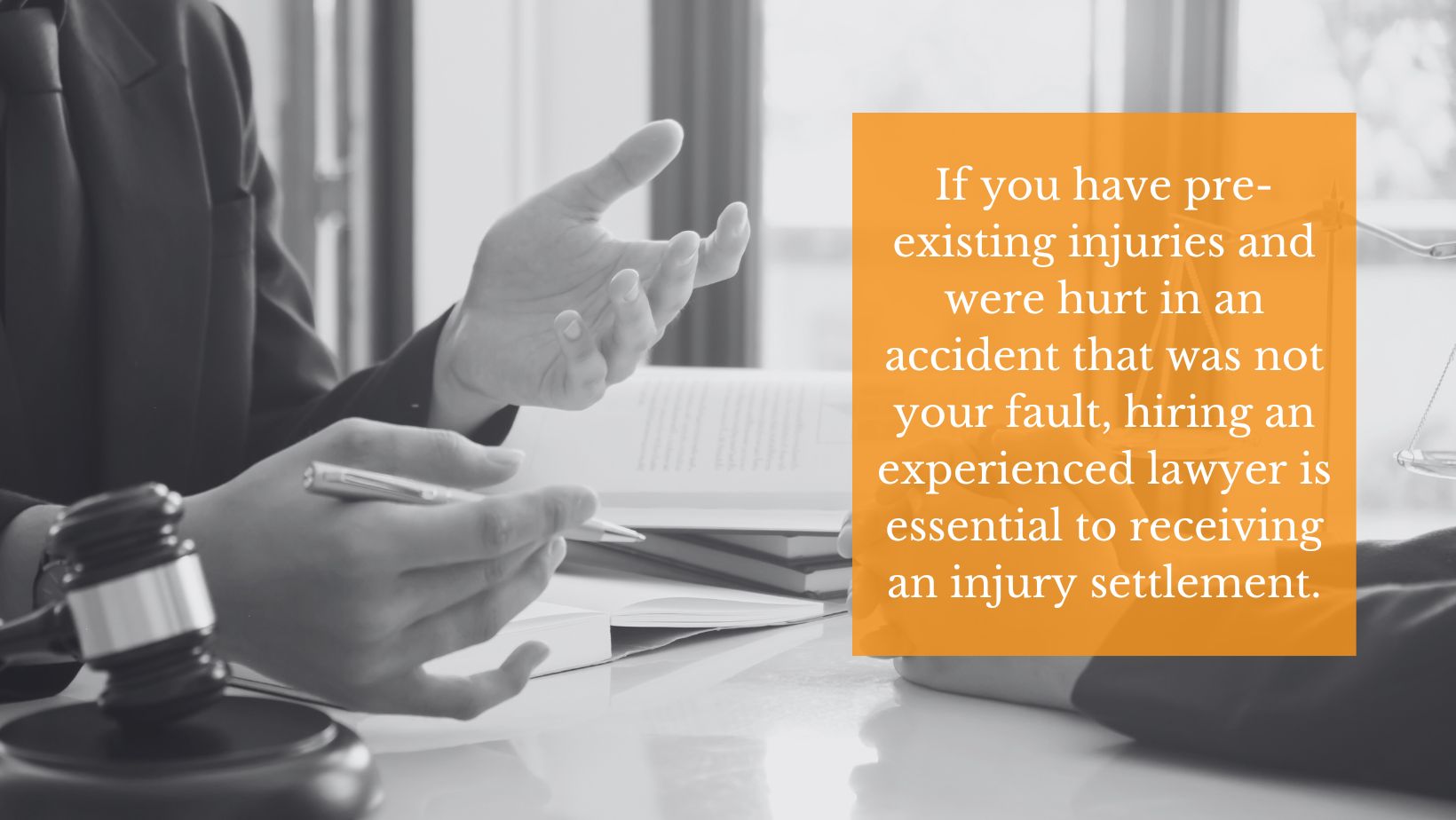Can a Pre-Existing Injury Keep You From Getting an Injury Settlement?

Accidents often aggravate pre-existing injuries. When someone else’s carelessness or negligence causes an accident, the person injured deserves compensation, even if they were injured before. Sadly, insurance companies often push back when an accident victim with a pre-existing condition pursues an injury settlement. Their legal teams try to prove the recent accident is not the cause of the victim’s pain.
In many cases, personal injury lawyers who represent accident victims can prove the wreck caused new injuries and worsened pre-existing pain.
Why Pre-Existing Injuries May Affect an Injury Settlement
When you are hurt in an accident that was not your fault, you may seek an injury settlement from the at-fault party’s insurance carrier. That company wants to give you the least amount of money possible – or nothing at all. Lawyers for insurance companies will always look for ways to prove their customer is not responsible for the claimant’s injuries. One tactic they use is to point to the accident victim’s pre-existing injury as the cause of their pain and suffering.
The term pre-existing injury in a lawsuit refers to any injury or illness the accident victim had prior to a recent accident. Insurance companies claim the following pre-existing injuries should keep a victim from receiving an injury settlement:
- Back or neck injuries
- Fibromyalgia
- Traumatic brain injuries
- Joint pain
- Arthritis
- A herniated disc
- Earlier concussions
- Cardiovascular disease
- Respiratory illnesses
Think about it. A significant percentage of people hurt in car wrecks and other accidents have one or more of these conditions. If the insurance companies had their way, they would convince juries these pre-existing injuries or illnesses are causing the claimant’s current pain or discomfort, and few people would receive injury settlements. Fortunately, personal injury lawyers prove accidents can aggravate injuries and cause new ones and people get the compensation to pay their expenses.
Proving a Recent Accident is Aggravating a Pre-Existing Injury
If you have pre-existing injuries and were hurt in an accident that was not your fault, hiring an experienced lawyer is essential to receiving an injury settlement. The attorney will evaluate your case, guide you through the claim process, and negotiate with the insurance companies.

Evaluating Your Case
Your lawyer will ask how the accident is aggravating your injury. They also will find out whether the accident caused new injuries. The goal is to show the extent of your injuries and the accident’s impact on your finances. The evaluation will include:
- The short and long-term impact of the injuries on your health.
- Medical treatment expected in the months and years ahead.
- The negative impact of the injuries on your ability to work and care for your family.
- How the accident and injuries are affecting your mental health.
After a thorough evaluation, your personal injury lawyers will develop a plan for securing an injury settlement to cover the damage caused by the accident.
Navigating the Claim Process
Insurance companies do not make it easy for accident victims. An experienced lawyer will argue for a suitable settlement for you. If the insurer is unwilling to pay a fair settlement, your attorney may have to take your case to trial.
Missouri and Illinois Deadlines for Pursuing an Injury Settlement
Some accident victims need time to recover before they begin seeking the money they need for medical bills and other expenses. The Missouri statute of limitations (§RSMo Chapter 516) gives people five years to file a personal injury lawsuit. In Illinois, the statute of limitations on personal injury cases is two years.
Missouri Exceptions
Missouri courts will extend the five-year window for pursuing an injury settlement in two cases:
- When the claimant was under the age of 21 or mentally incapacitated at the time of the accident. In this case, the claimant has five years after they reach age 21 or they are declared competent to file a claim. (§RSMo 516.170)
- When the defendant (the person responsible for the accident) leaves the state. The five years to file will begin when the defendant returns to Missouri. (§RSMo 516.200)
Judges will not extend the statute of limitations for others. Thus, if you need legal help with receiving compensation for your injuries, pain, and suffering, contact an attorney as soon as possible.
Illinois Exceptions
The Illinois Code of Civil Procedure (§735 ILCS 5), like the Missouri law, extends the deadline for filing a personal injury claim in certain cases including:
- The victim is under age 18. The clock on the two years to file starts on their 18th birthday.
- The victim is disabled. The two-year period to file begins when their disability is resolved.
- If the victim becomes disabled within the two-year period to file, the clock will pause until they are no longer disabled.
- If the defendant, the person responsible for the accident, leaves Illinois, the clock pauses until they return.
Judges sometimes deny requests for more time. They may want more proof of a person’s disability. In other cases, they question whether the defendant actually left the state. To avoid missing the deadline to file, contact a personal injury lawyer as you become aware of an accident you did not cause aggravating a pre-existing injury.
The experienced personal injury lawyers at Hipskind and McAninch will protect your rights and fight for what you deserve for your injuries and losses. Contact our law firm in an office near you to speak with our lawyers and begin your personal injury claim.
Category:
Tags:
aggravating an injury, injury settlement, pre-existing injury